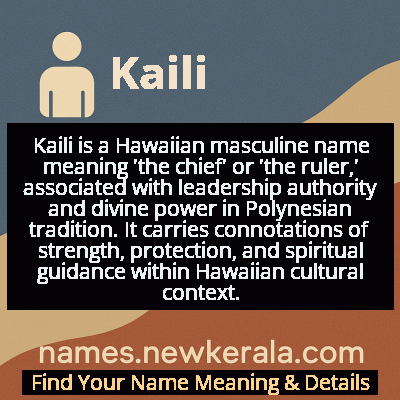Kaili Name Meaning & Details
Origin, Popularity, Numerology Analysis & Name Meaning of Kaili
Discover the origin, meaning, and cultural significance of the name KAILI. Delve into its historical roots and explore the lasting impact it has had on communities and traditions.
Name
Kaili
Gender
Male
Origin
Hawaiian
Lucky Number
6
Meaning of the Name - Kaili
Kaili is a Hawaiian masculine name meaning 'the chief' or 'the ruler,' associated with leadership authority and divine power in Polynesian tradition. It carries connotations of strength, protection, and spiritual guidance within Hawaiian cultural context.
Kaili - Complete Numerology Analysis
Your Numerology Number
Based on Pythagorean Numerology System
Ruling Planet
Venus
Positive Nature
Harmonious, responsible, caring, and artistic.
Negative Traits
Overly idealistic, superficial, possessive, or jealous.
Lucky Colours
Pink, turquoise.
Lucky Days
Friday.
Lucky Stones
Diamond, turquoise.
Harmony Numbers
2, 3, 9.
Best Suited Professions
Artists, musicians, teachers, healthcare workers.
What People Like About You
Warmth, nurturing nature, artistic flair.
Famous People Named Kaili
Kaili Chun
Contemporary Artist
Renowned Hawaiian sculptor and installation artist whose work explores indigenous identity and environmental themes
Kaili Kāne
Cultural Practitioner
Prominent keeper of traditional Hawaiian navigation and wayfinding techniques, teaching celestial navigation across Polynesia
Kaili W. K. K. K.
Community Leader
Influential advocate for Hawaiian language revitalization and cultural preservation initiatives
Name Variations & International Equivalents
Click on blue names to explore their detailed meanings. Gray names with will be available soon.
Cultural & Historical Significance
Historically, names carrying divine associations were reserved for individuals expected to demonstrate exceptional leadership qualities or those born into chiefly lineages. Kaili represents not just personal identity but collective cultural memory, linking contemporary bearers to generations of Hawaiian history and spiritual practice. The name's endurance through centuries of cultural change demonstrates its deep roots in Hawaiian worldview and the ongoing relevance of traditional values in modern contexts. It stands as a testament to cultural resilience and the preservation of indigenous knowledge systems.
Extended Personality Analysis
Individuals named Kaili typically exhibit strong leadership qualities combined with deep emotional intelligence and cultural awareness. They often demonstrate natural authority that is neither aggressive nor domineering but rather emerges from their competence and genuine care for others. These personalities tend to be calm under pressure, thoughtful in decision-making, and possess an innate understanding of group dynamics that makes them effective mediators and organizers. Their strength lies in their ability to inspire trust and cooperation through consistent, principled behavior.
Beyond leadership capabilities, Kaili-named individuals often show strong connections to their heritage and cultural traditions. They frequently serve as cultural ambassadors or community pillars, balancing respect for tradition with innovative thinking. Their personality typically includes protective instincts toward family and community, combined with wisdom that comes from understanding both historical context and contemporary challenges. They excel in roles that require bridging different perspectives and creating unity from diversity, making them valuable contributors to both traditional and modern social structures.
Modern Usage & Popularity
In contemporary naming practices, Kaili maintains a distinctive presence primarily within Hawaiian and Polynesian communities, where it serves as an important marker of cultural identity and heritage. While not widely popular in global naming trends, the name has experienced renewed interest as part of the Hawaiian cultural renaissance movement that began in the late 20th century. Modern usage often reflects intentional cultural preservation, with parents choosing the name to honor ancestral connections and instill traditional values in their children. The name appears most frequently in Hawaii and among Hawaiian diaspora communities, with occasional adoption by non-Hawaiians who appreciate its cultural significance and melodic qualities. Its usage remains steady rather than trending, reflecting its status as a culturally significant rather than fashionable choice.
Symbolic & Spiritual Meanings
Symbolically, Kaili represents the ideal of benevolent leadership and the sacred responsibility that accompanies influence and authority. The name embodies the concept of pono (righteousness) in Hawaiian philosophy, where power is exercised with balance, justice, and concern for collective wellbeing. Metaphorically, Kaili symbolizes the navigator who guides communities through challenges while maintaining connection to ancestral wisdom and cultural roots. The name also carries connotations of protection and guardianship, representing the role of caretaker for both people and traditions. In broader symbolic terms, Kaili stands for cultural continuity and the living presence of ancestral knowledge in contemporary life, serving as a bridge between past wisdom and future possibilities.

